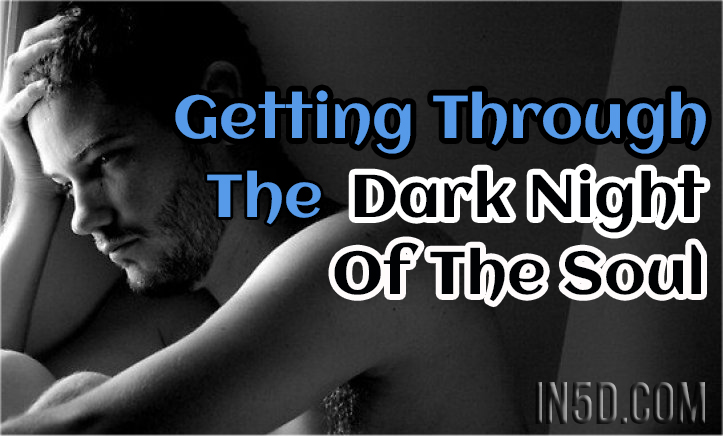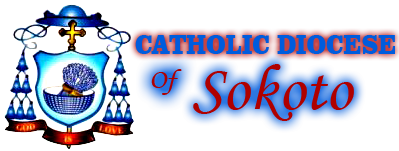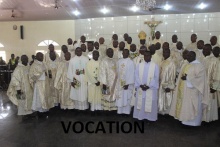DARK NIGHT OF THE SOUL
Fr. Gerald Musa
“Dark Night of the Soul” is the title of a poem written by John of the Cross. He wrote this poem when he was blindfolded and was languishing in the darkness of a prison cell. The dark night of the soul is a metaphor, which describes a period in life when we go through intense hardships and frustrations. It is a period of intense pain, depression, fear, sleepless nights, abandonment, helplessness, loneliness, emptiness, unending struggles and troubles, questioning, doubts, and a time when we appear to be sinking in a dark bottomless pit. Dark night of the soul is a time when God seem to be absent and very far away from our lives. When the Psalmist finds himself in a dark night of the soul, he groans inwardly in his anguish saying, “Tears (have) become my bread day and night” (Psalm 42:3). When Jesus found himself in a dark night of the soul he cried out loudly saying: “My God, my God, why have you forsaken me” (Psalm 22:1; Matthew 27:46).
John the Baptist experienced a long dark night of the soul. He was thrown into prison in Machaerus, on the east of the Dead Sea for speaking truth to power. King Herod caged John because he spoke against the King’s irregular marriage. While John remained in this dark dungeon his soul was dampened with frustration. He was apparently confused and disheartened. He desperately needed words of hope and consolation. His last hope was in that messiah who he baptized and about whom he preached. Therefore, “He sent his disciples to Jesus with this question, “Are you the one who is to come, or should we look for another?” (Matthew 11:3). This was a critical point in John’s life. It was his period of doubts and questioning.
Dark night of the soul is not only experienced on individual level. Families, groups, communities and nations also experience a period when hope seems to be bleak. For example, the people of Israel had their experience of the dark night of the soul during the time of their exile in Babylon. They were taken from their land into captivity. They were longing to go back home, they were nostalgic and they expressed this deep feeling in Psalm 137:1-4:
By the rivers of Babylon we sat and wept when we remembered Zion. There on the poplars we hung our harps, for there our captors asked us for songs, our tormentors demanded songs of joy; they said, “Sing us one of the songs of Zion! How can we sing the songs of the Lord while in a foreign land?
So, what is the spiritual value of the dark night of the soul? St. John of the Cross sees the dark night of the soul in a positive light. According to him, it is a period of maturity in our relationship and union with God. He says, “In the dark night of the soul, bright flows the river of God.”
During the period of the dark night of the soul, “we groan inwardly as we wait eagerly for our adoption as sons, the redemption of our bodies" (Rom. 8: 23). But the dark night of the soul does not last forever. A Hausa proverb says, komin nisan dare, gari zai waye (The dawn will come, no matter how long the night is). An English proverb says around every dark cloud there is silver linen. The dark night of the soul requires patience and fortitude and this is why the Apostle James notes that dealing with dark night of the soul needs a farmer’s patience. “See how the farmer waits for the precious fruit of the earth, being patient with it until it receives the early and the late rains. You too must be patient. Make your hearts firm…” (James 5:7-10).
Patience can produce good fruits. It can lead us to understand the meaning of the dark night, which we are passing through and patience helps us wait for God’s intervention, which comes slowly but surely. The prophet Isaiah offers hope to those who sit in darkness and in the shadow of death. He says, “Let the one who walks in the dark, who has no light, trust in the name of the Lord” (Isaiah 55:10-11). He adds, “Say to those whose hearts are frightened: Be strong, fear not” (Isaiah 35:4).
In addition, the prophet offers those in the dark night of exile words of hope for a brighter future. He assures them that at the appropriate time, God will step in to intervene in their plight, to revive, reinvigorate and make new things happen in their lives. The prophet declares,
“Here is your God, he comes with vindication; with divine recompense he comes to save you. Then will the eyes of the blind be opened, the ears of the deaf be cleared; then will the lame leap like a stag, then the tongue of the mute will sing” (Isaiah 35:4-6).
This prophecy of Isaiah finds a perfect fulfillment in the coming of the Messiah and this is where Jesus offers a response to the question of John the Baptist. He says to the disciples of John: “Go and tell John what you hear and see: the blind regain their sight, the lame walk, lepers are cleansed, the deaf hear, the dead are raised, and the poor have the good news proclaimed to them” (Matthew 11:4-5).
Let us in a special way remember and pray for all those who suffer from depression, frustration, political prisoners and prisoners of conscience, the sick, the lonely, the bereaved, those whose spirits are dampened by some difficulties of life, and those whose hearts are faint as a result of crises in relationship, as well as those who are on the brink of despair.
As we get closer to the celebration of the Christmas, may the Lord open our eyes to see him more clearly even in the dark night of our souls; may he heal our broken hearts; may he open our ears to listen to him closely and heal our dumbness that our tongues may sing his praises as we rejoice.
---------------------------------------------------
Third Sunday of Advent Year A/ Isaiah 35:1-6, 10; James 5:7-10; Matthew 11:2-11


